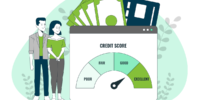CORRELATION BETWEEN CREDIT AND DEBT RATING
In general, your credit score and debt are closely linked. Your credit score is affected by the amount of debt you have and how you manage and make payments. You must understand the relationship between credit rating and debt, as well as how they are linked. To put it another way, an individual cannot have a credit rating until he or she has taken on any debt.
Before jumping to the root topic, it’s better to know briefly about these two terms – credit rating and debt.
WHAT IS A CREDIT RATING?
In general terms, credit rating represents the credit worthiness of the borrower with respect to a specific debt or financial obligation. A credit rating can be given to any entity that seeks to borrow money— whether it’s an individual, a business corporation, a state or provincial authority, or a sovereign government.
A good credit rating indicates that you have a good history of making payments on time. This credit rating can create impact on the bank’s decision to approve your loan application at a reasonable interest rate. Credit rating is usually expressed in alphabetical symbols. Although it is a relatively new concept in the Indian financial industry, it is gaining increased popularity. It assists investors in recognizing the risk involved in lending money and provides an accurate assessment of the borrower’s creditworthiness.
WHAT IS DEBT?
Debt is defined as something borrowed from another party, usually money. Many organizations and individuals use debt to make major purchases whenever they are unable to make payments under normal circumstances. A debt agreement allows a borrower to borrow money on the condition that it be repaid at a later date, usually with interest.
Loans, such as mortgages, vehicle loans, personal loans, and credit card debt, are the most common forms of debt. According to the terms of the loan, the borrower is obligated to repay the loan balance by a specific date, usually several years in the future.
As you got a clear understanding of credit rating and debt, let’s dive into the root topic – how they are correlated with each other!
Credit rating and debt hold a unique relationship because one cannot exist without the other. Individuals with no credit rating have a very poor chance of receiving credit because one cannot have a credit rating without debt. While this may sound confusing to some, it is actually quite simple and straightforward.
In general, you can obtain a CIBIL report only if you currently have or formerly had a debt. Furthermore, a CIBIL report requires a six-month credit history, and it is not possible to obtain one without a debt. You should be aware that loan applications are simply rejected or approved based on your CIBIL score.
HOW DOES DEBT ACTUALLY IMPACT YOUR CIBIL SCORE?
As previously stated, debt is required to obtain a CIBIL score, and there are a few debt-related scenarios that can help determine it. Credit card payments and loans are perhaps the most fundamental forms of debt that exist today, and how a debtor handles these aspects can make or break the CIBIL score.
Factors like failing to pay your bills on time or completely skipping them will affect your CIBIL score. This may cause banks to avoid any further interactions with you in the future. If you have a tendency to bounce between secured and unsecured debt, your CIBIL score may improve. It demonstrates to lenders that you are a diligent borrower who is willing to pay the collateral damage against a loan.
TIPS ON HOW TO MANAGE YOUR DEBT AND IMPROVE YOUR CREDIT SCORE
Follow the below-mentioned tips to manage your credit rating and debt effectively.
- ALWAYS PAY OUTSTANDING DUES ON TIME
If you have a debt, such as a credit card or a loan, it is essential that you pay it back on time. It will improve your credit score and make it easier for you to get approved for any credit product in the future, with benefits like low-interest rates and pre-approved loan and credit card offers.
- PAY MORE THAN THE MINIMUM PAYMENT REQUIRED
If you merely pay the minimum amount due on your credit cards, it will take years to pay off the balance, and at higher interest rates. To save money, it’s preferable to pay off your credit card balances on whole and on time each month.
- PLAN YOUR EXPENSES WITH A MONTHLY BUDGET
Following a monthly budget plan ensures that you have the money to meet your payment expenses. If it appears that you will not be able to pay your payments this month or next, you should always plan ahead of time so that you can take action as soon as possible. A budget will assist you in planning and spending any extra money after all expenses have been covered. This extra cash might be used to pay down debt more quickly.
- MONITOR YOUR CREDIT REPORTS REGULARLY
You should check your credit reports on a regular basis to ensure that they are correct and to identify areas where you can improve. Any of the credit bureaus, such as CIBIL, Equifax, and Experian, can provide you with a free copy of your credit report. If you discover an error on your credit report, you can contact them to get it corrected.
Bottom Line
The relationship between debt and CIBIL score is bidirectional. If a debt has an impact on your CIBIL score, the CIBIL score will have an impact on your debt. Banks and other financial institutions assess your creditworthiness based on your CIBIL score. A low CIBIL score can result in your debt application being rejected; on the other hand, a high CIBIL score can help you get your loan as quickly as possible.




